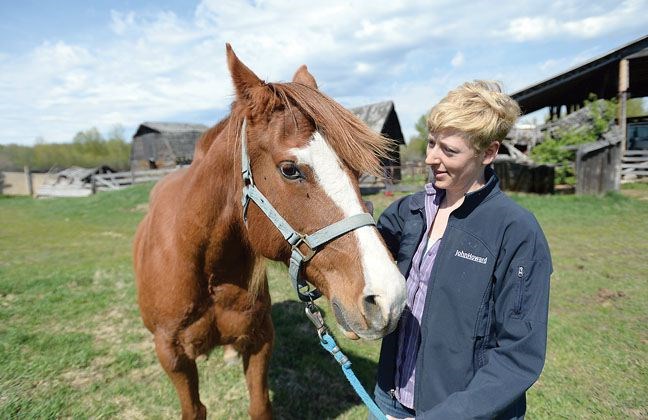A horse is like a mirror.
When Lisa Loewen facilitates equine therapy at the Prince George stables she can see it absorb the tension in some people and offer them a window back into themselves.
"They're so sensitive," she says.
This summer, starting in June, the therapeutic approach will be offered to women who have been victims of violence.
"It allows people to be more in touch with their emotions and realize the way that they're behaving (is) having an impact on people or the animals around them and realize there's a way to handle this," says Loewen, who with her three horses has an equine wellness business but also works as a family violence facilitator at the Northern John Howard Society in Prince George.
Through the horses, she can offer a holistic approach to health and hopefully offer pathways for the women to build on their abilities to communicate, connect and create.
"Really (it's) about establishing a foundation for healthy boundaries, healthy communication and mindfulness and working around horses because they are big creatures and they can come across as intimidating, we need to be in the now."
That is one of Loewen's key lessons for participants: live in the moment.
"The horse is always living in the now and the horse is always breathing from its belly," she says.
"When we can focus on their behaviours - to come back to the now and transfer that to ourselves can be a pretty profound moment."
She's felt those moments herself, as a young girl on a remote farm in northern Alberta.
"I grew up with horses, basically horses kind of saved my life."
She spent much of her time with them.
"That was sort of my own therapy," says Loewen, who eventually went on to get an undergraduate degree in psychology.
"I've always had an interest in psychology and wanted to marry the two and that's when I found the formal certification of EFW (Equine Facilitated Wellness) facilitator."
A few years ago, when it had funding, the society offered a similar program to parolees. She remembers very clearly the effect the horses had on those men.
"(They) allowed themselves to play and to enjoy and to put their guard down - to connect, to feel the warmth of that creature and allow them to let go and to ride," says Loewen, although she stresses the focus is on the groundwork and interaction, with very little work on the horse's back. "There was some pretty profound moments of connection and trust and understanding boundaries because the horse is such a big animal."
Equine Facilitated Wellness is not a clinical approach, so if something arises beyond her scope or training then she would refer, but she's found horses in particular are accessible to all types of people.
"It's different than being stuck in this room... you get to interact with a living creature, a willing partner."
Most days the work is on the ground. They even use the horses as canvases, using chalk to draw messages or colours on the living pallet.
The program will run four times, once monthly between June and September and each session will be open to about eight to 10 women. It is confidential and Loewen says the society is calling on anyone to express interest. It was made possible by a $2,500 IMAGINE grant, one of 49 offered through Northern Health this year.
"It's not a lot of money but it's start," says Wayne Hughes, executive director of the JHS, "It's only going to last for the summer because then our finances will be depleted."
He says the therapy will really augment the STOP program (Stop Taking it Out on your Partner), and the organization has "always had our eye open to keep the equine wellness program going.
"It was a no-brainer to try and put two and two together."



